Leaving obesity in the dust
Bariatric surgery helps Winter Rhodes reclaim his running and his health
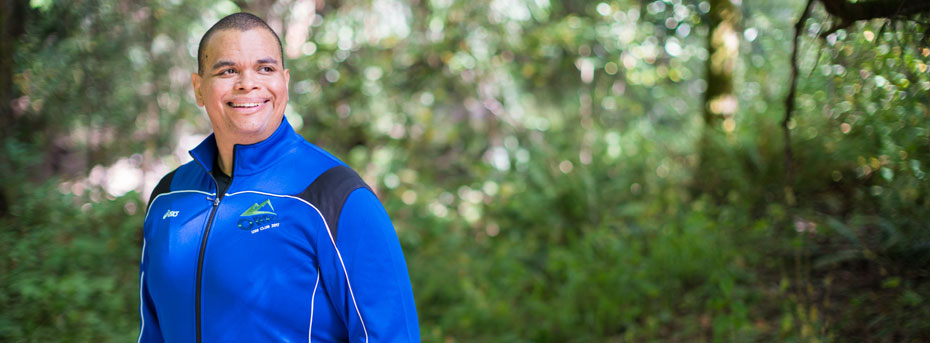
It’s easy to understand why Winter Rhodes — family man, aspiring distance runner and former Navy technician — hit 380 pounds.
It was the weight: The mental, emotional and physical weight of being unemployed. Of nearly losing his oldest daughter to drowning. Of holding his family together during her months of recovery.
Rhodes saw his dream of running a marathon — and, worse, his chances of living to 50 — slipping away as he developed diabetes, high blood pressure and leg sores.
Even for a man used to challenges, this was a big one.
Daughter’s long recovery
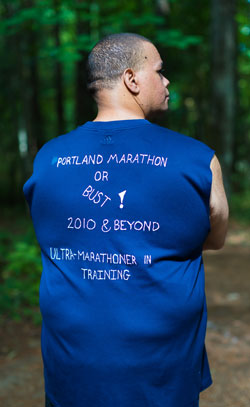
Rhodes had trouble finding work after his eight-year Navy career as a nuclear engineering technician. Temp agencies in his native San Diego got him security jobs for $4.95 an hour.
“I wasn’t working out a whole lot because I was working to make money,” he says.
The agencies eventually found him restaurant jobs. The man who once hated cooking learned to love it. But “I really started to add weight,” says Rhodes, now 46 and living in Tigard.
In 1999, Rhodes married his wife, Kimberlee, and landed a job at Intel in Hillsboro. He carried 340 pounds on his 6-foot-1 frame. Spending hours in a sedentary job in a research lab didn’t help. Intel provides gyms, he says, “but you have to have time to use them. I didn’t make time.”
Finally, inspired by a video featuring a runner with a prosthetic leg, he decided to run a marathon. “I thought if that guy can do it, so can I.” In 2009, he started training for the 2010 Portland Marathon.
He taught himself to run properly, despite his weight, working up to a 35-mile training run. “Now, it wasn’t fast, but I made it.”
Then his 6-year-old daughter nearly drowned. She was in dire condition when Rhodes and his wife arrived at the hospital.

“I found myself thinking, ‘Whether I have to bring her home in a casket or a wheelchair, she’s my daughter,’” Rhodes says, his eyes burning intently. “I started talking to her, telling her to come back to me. Her oxygen started to improve, and she started to come back.”
But she faced a long recovery, spending six months in the hospital. Kimberlee left her career as an attorney to care for her, living in the hospital room. Rhodes’ mother helped care for their then-2-year-old daughter.
“My routine was I would cook for my mom and youngest daughter, work a 12-hour graveyard shift at Intel, sleep for three to four hours, get up and go to the hospital to see my daughter. Day after day,” Rhodes says.
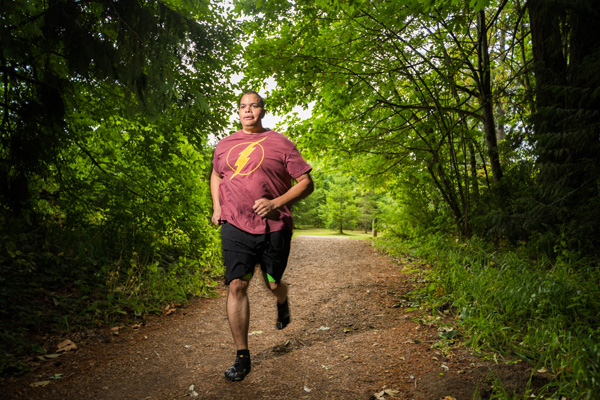
A co-worker gave him an old Army cot for the hospital room. “I was on that thing for about two hours and felt something shift under me — one of the legs had collapsed,” Rhodes says. “I was saying to myself, ‘I’m heavy, but I can’t do anything about it.’”
When the day of the marathon came, Rhodes could only watch as the runners plodded down the street below his daughter’s hospital window. His dream would have to wait.
“This is where I reclaim my life”
Once their daughter returned home, Rhodes often drove her to therapy on top of work and other chores.
“That was my life for a couple of years,” he says. “I ate a lot of pizza, Taco Bell, stuff like that.”
By the time she returned to school several years later, he weighed 380. Tests showed “I could be dead by the time I was 49. And I didn’t like that. I didn’t like that idea at all.”
He’d rejected bariatric surgery before, thinking, “I’m ex-military, I know how to do this.” Now he was willing to consider it. Surgery, his doctor told him, could reduce his diabetes and other issues.
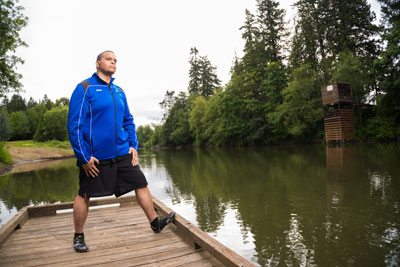
Rhodes talked it over with his wife. “She agreed, and we made the decision to go ahead.”
His doctor recommended OHSU, and Rhodes had gastric sleeve surgery in December 2015. The surgeon removed about 80 percent of his stomach, reducing his calorie intake and the hunger signals to his brain.
A few hours after surgery, Rhodes’ nurses woke him.
“They told me to start walking,” he says, “but there was something else in my head. I said, ‘This is where I reclaim my life.’”
He saw a board, part of OHSU’s Walk to Recovery program, that showed how many trips around the nurses’ station equaled a mile. “I said, ‘Aha, hold on, a challenge!’ I walked over a mile and a half in one day,” IV in tow.
At home, he’d set a timer and walk 15 minutes before turning back. “I did that rain or shine,” he says. “On my lunch breaks at work, I started getting on a treadmill for 30 minutes every day. I made a commitment to move my body every day for 30 minutes.”
Moving on from food mistakes
Now he’s running five or six miles a day. He’s proud of a running club jacket he got for covering 1,200 miles in one year. And he’s in the gym every day after dropping his kids at school, doing 300 to 400 sit-ups and weight training.
He’s down to 230 pounds. Not only that, his diabetes has abated, and his leg sores have disappeared, though he still takes high blood pressure medicine.
He has set his sights set on a four-day set of races, including a marathon, and the 100-mile Western States Endurance Run.
“If you believe you can cover 20 miles, why can’t you?” he says. “It’s confidence in yourself.”
He has also changed how he cooks and eats. “There’s a philosophy behind it now,” Rhodes says, wrapping his hands around a cup of hot chocolate at a Tigard Starbucks. (“My one little splurge for the day.”)
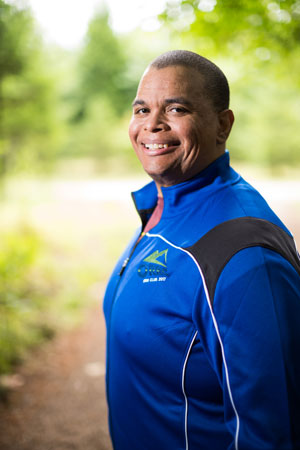
Because he burns so many calories running, he’s hungry a lot. That means normal bariatric nutrition guidelines won’t cut it. Instead, he’s exploring the limits, testing and refining how to supply his body with food and fluid. He’s sharing what he learns with his supportive team at OHSU to help others.
Like any bariatric patient, he’s had missteps. When saltines weren’t tasty enough, he switched to buttery Ritz crackers — until he realized they had a lot more calories.
“I have an ongoing food funeral — I’m always wearing black,” he says, his easy laugh rolling across the crowded coffee shop. “Put a little flag on the crackers as you send ’em down the river. You almost want to set them on fire, like a Viking funeral.”
Rhodes knows it’s easy for bariatric patients to take food mistakes hard. But he’s learned that he can slip up one day and commit to staying on track the next.
“If I make mistakes today, if I have some M&Ms or something, I feel it. My body isn’t used to it,” he says. “I know that somewhere in my future is another M&M, but today I finish out my commitment to not having one tomorrow.”
Preparing for the Dopey Challenge
Rhodes’ oldest daughter is 14 now. “She still has some issues, but she’s OK,” Rhodes says.
When she was in the hospital, he promised to take her to Disney World so she could visit “the happiest place on Earth after this tragedy.” The family made the trip about a year after she came home.
There, Rhodes discovered the four-day Dopey Challenge, with a 5K, 10K, half marathon and marathon. Now he plans to take the family back for his 50th birthday. “Of course, I want to do all four of them,” he says.
Of his new goals, he says: “I’m not Superman or anything. I’ve wanted to do this for a long time. And now that I can, I’m going to.”
— By Pete Lesage, a Tigard writer and editor who previously worked as a reporter, editor and director at The Oregonian.
Learn more
- Register for our free bariatric surgery seminar, your first step toward a healthier life.
- Find out if you're a candidate for bariatric surgery.